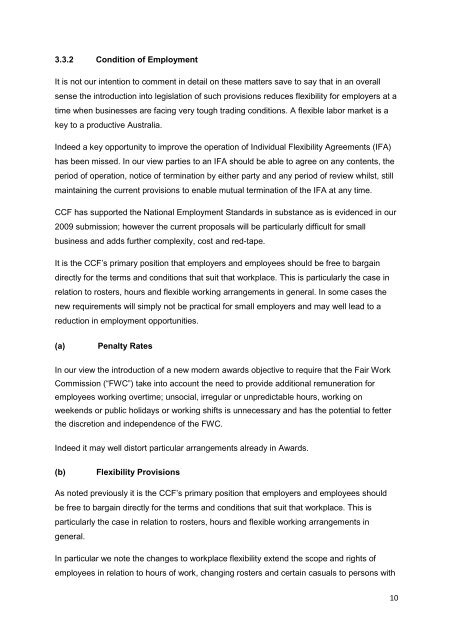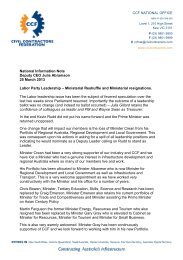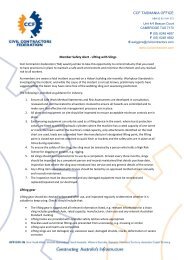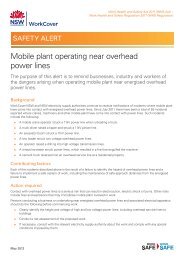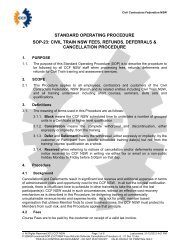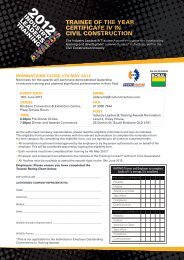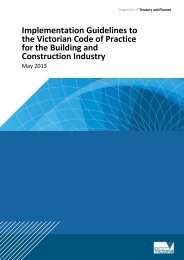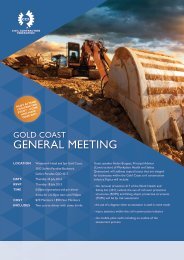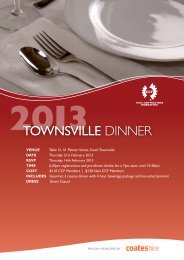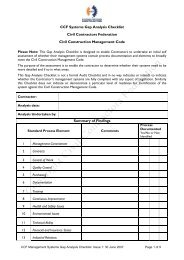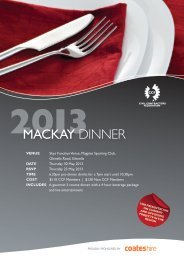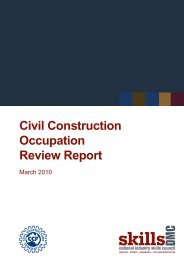Submission to FWA Inquiry - April 2013 - Civil Contractors Federation
Submission to FWA Inquiry - April 2013 - Civil Contractors Federation
Submission to FWA Inquiry - April 2013 - Civil Contractors Federation
Create successful ePaper yourself
Turn your PDF publications into a flip-book with our unique Google optimized e-Paper software.
3.3.2 Condition of Employment<br />
It is not our intention <strong>to</strong> comment in detail on these matters save <strong>to</strong> say that in an overall<br />
sense the introduction in<strong>to</strong> legislation of such provisions reduces flexibility for employers at a<br />
time when businesses are facing very <strong>to</strong>ugh trading conditions. A flexible labor market is a<br />
key <strong>to</strong> a productive Australia.<br />
Indeed a key opportunity <strong>to</strong> improve the operation of Individual Flexibility Agreements (IFA)<br />
has been missed. In our view parties <strong>to</strong> an IFA should be able <strong>to</strong> agree on any contents, the<br />
period of operation, notice of termination by either party and any period of review whilst, still<br />
maintaining the current provisions <strong>to</strong> enable mutual termination of the IFA at any time.<br />
CCF has supported the National Employment Standards in substance as is evidenced in our<br />
2009 submission; however the current proposals will be particularly difficult for small<br />
business and adds further complexity, cost and red-tape.<br />
It is the CCF’s primary position that employers and employees should be free <strong>to</strong> bargain<br />
directly for the terms and conditions that suit that workplace. This is particularly the case in<br />
relation <strong>to</strong> rosters, hours and flexible working arrangements in general. In some cases the<br />
new requirements will simply not be practical for small employers and may well lead <strong>to</strong> a<br />
reduction in employment opportunities.<br />
(a)<br />
Penalty Rates<br />
In our view the introduction of a new modern awards objective <strong>to</strong> require that the Fair Work<br />
Commission (“FWC”) take in<strong>to</strong> account the need <strong>to</strong> provide additional remuneration for<br />
employees working overtime; unsocial, irregular or unpredictable hours, working on<br />
weekends or public holidays or working shifts is unnecessary and has the potential <strong>to</strong> fetter<br />
the discretion and independence of the FWC.<br />
Indeed it may well dis<strong>to</strong>rt particular arrangements already in Awards.<br />
(b)<br />
Flexibility Provisions<br />
As noted previously it is the CCF’s primary position that employers and employees should<br />
be free <strong>to</strong> bargain directly for the terms and conditions that suit that workplace. This is<br />
particularly the case in relation <strong>to</strong> rosters, hours and flexible working arrangements in<br />
general.<br />
In particular we note the changes <strong>to</strong> workplace flexibility extend the scope and rights of<br />
employees in relation <strong>to</strong> hours of work, changing rosters and certain casuals <strong>to</strong> persons with<br />
10


